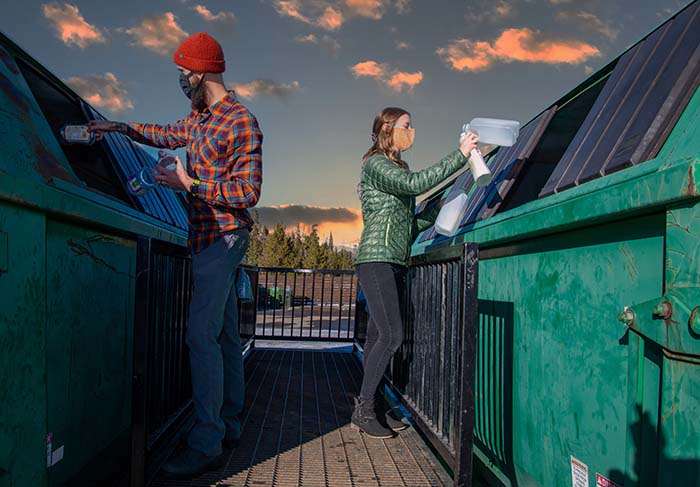MATERIAL MANAGEMENT
The Town is focused on reducing overall material consumption and increasing recycling and composting across the community. An effective material management system requires the coordination of waste collection, handling, education and prevention. The Town continues to implement measures to improve its material management system including introducing programs such as Pay-As-You-Throw that have been successful in other towns.

Goal.
Reduce materials going to landfill by reducing waste at the source and increase the proportion of what remains that goes to recycling and composting
Target.
20%
Reduction in municipal solid waste generation by 2035
40%
Diversion of landfill waste to recycling and composting by 2035

Annual Solid Waste Generation and Diversion Trends and Target
21%

Reduction in municipal
solid waste generation
2022 saw a
Increase in municipal
solid waste generation
2035 TARGET
over baseline year 2017
20%
For a better view at the charts, use landscape view on mobile devices.

2022 saw a
Diversion of landfill waste
21%
40%
Diversion of landfill waste
2035 TARGET
For a better view at the charts, use landscape view on mobile devices.
Strategies.
Implement Pay-As-You-Throw and Universal Recycling OrdinanceUnder the Pay-As-You-Throw program, recycling service is included with trash service, and residential customers are charged for the collection of ordinary household trash based on the amount they put out for disposal at a landfill. The Universal Recycling Ordinance applies to multi-family housing and businesses, requiring that recycling service be available for all entities with trash service.
Establish landfill bans on easily recycled itemsThis strategy looks at extending the life of the landfill (which is expected to be full by 2056) through a ban on disposal of targeted materials such as cardboard. Yard waste, food scraps, and aluminum products may also be included in the ban.
Develop and implement construction and demolition waste diversion for new construction / major renovations General contractors would be required to reuse or recycle the construction debris from affected projects. This diversion threshold should be set as a percentage of total waste generated or pounds per floor area.
Target glass for recycling and organics for compostingInstalling additional glass depots around town should lead to more glass recycling and keep the extra glass out of the landfill. More organics (food and landscaping waste) with composting potential should similarly be kept out of the landfill through expanded drop-off locations.
Expand food waste rescueThe Town should expand its food recovery and donation program by partnering with restaurants and grocery stores to provide regular food rescue services focused on fresh edible produce and highly perishable items that would otherwise end up in landfills because of expired “sell by” dates and cosmetic blemishes.
Promote a circular economy by expanding second-hand retail and repair servicesA circular economy reduces material use by intercepting waste before it ever reaches a garbage can, recycling bin, or composting container. The Town will help attract second-hand retail and repair services within easy reach of residents and businesses.
Phase out plastic beverage bottles by 2024In 2021, the Town phased out single-use plastic and compostable plastic bags. The Town wants to leverage that momentum and expand the ban to plastic beverage bottles.
Re-evaluate program scope for shared dumpster enclosure programThrough additional funding and staff resources, the Town’s comprehensive material management plan should be re-evaluated to look at how the Town manages trash, recycling, and compost/organics management in these areas.
Continue participation in the County’s Zero Waste Task Force and Strong Future Advisory CommitteeThe Summit County Zero Waste Task Force is a diverse group of community stakeholders that is working to develop recommendations on recycling and other local waste-diversion programs.
Hire a material management coordinatorHire a full-time onsite material management coordinator who will track and monitor waste generation; identify, budget, and implement material management projects, as well as focus on outreach and recycling awareness.
Develop sustainable procurement policiesCreating an Environmentally Preferable Purchasing Policy to govern Town government purchasing engenders a more efficient, non-discriminatory, and transparent government spending system.
Co-Benefits
Environmental Leadership
Regional Priorities
Operational Cost Savings
Livability
Local Environmental Health
Community Engagement
Environmental Leadership
Regional Priorities
Operational Cost Savings
Livability
Local Environmental Health
Community Engagement
Stretch Targets.
Fleet Electrification for Haulers
Incentivize waste haulers to electrify fleets by 2032